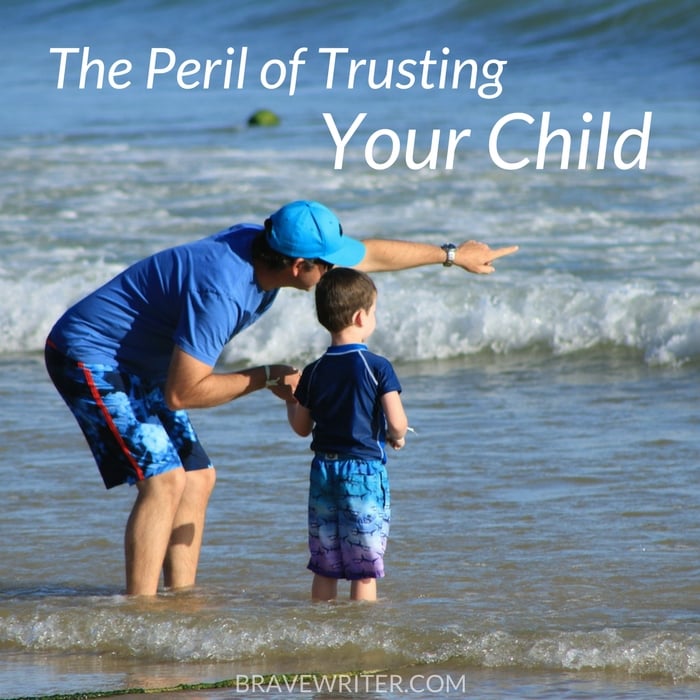The Peril of Trusting Your Child

I get email every day from parents who love their kids, who think they’ve got the most creative, smart, surprising little people living under their roofs. They share stories, their children’s writing, photos, and detailed accounts of what their kids are doing. These parents are wowed, amazed. And they should be! Their children ARE amazing. So are yours.
Yet often, even in the same email, a paragraph of worry inevitably follows.
- What if this brilliant child isn’t on course to graduate at 18?
- What if this parent isn’t pushing hard enough to fit in lab sciences or essays?
- What if the child next door who goes to school is completing more “official” work?
- What if trusting your child’s natural learning process is a mistake?
- How can a parent know if he or she is traveling down the wrong road before it’s too late?
It’s like two people live inside our minds: the one that knows our children and the one that doubts we know our children.
To trust means to let go of worry. Yet worry defines us! It’s what allows us to feel important, involved, and prepared. Worry proves we care. Worry shows that we are invested. Worry requires maintenance which involves google searches, online discussions, seeking counsel and advice, and the endless work of revising the plan. Worry feels like we’re doing what we should be. Worry leads to action—busy-ness, activity, lectures, and important new strategies to repair whatever it is we imagine is broken.
To trust means—well, what does it mean?
It looks like letting go—literally dropping the careworn hand-wringing, falling backwards without knowing if you’ll be caught. Trust is relying on today to be enough, not wondering about tomorrow, not forecasting doom for the future.
Trust is a big exhale—believing what you see with your own eyes and imagination. It means discounting the input that contradicts what you know inside.
Trust means you know inside.
Trust takes patience, the long view, time.
Trust feels irresponsible and naive.
Trust may be mistaken for denial.
Trust leads to missed opportunities, to overlooking a problem before it’s too late, to putting a child’s well-being ahead of your need to fix him or her.
You will miss some opportunities if you trust—if you put your child’s peacefulness ahead of your agenda to get it right. Trust means not hurrying to fill, fix, and finagle.
What we don’t always appreciate is that worry also makes us miss opportunities. We fill the time with activity and angst—robbing the present moment of joy or space to create or a chance to mature and develop. We hurry to the “next thing” rather than allowing some fallow time for reflection or puttering or simply enjoying a skill mastered.
Trust says: “I see my child and I am noticing all the ways that child is developing right before my eyes, like a Polaroid picture.”
Worry says: “I see what my child should be and isn’t.”
Because parenting is always new (every day, every year), it’s difficult to let trust take the reins. I know I couldn’t trust all day every day come what may. What I learned to do (and am still learning literally today!) is to see my worry and breathe it away.
I pause to consider: what can I trust now? In the middle of the muddle of worry, I can trust that:
- The lessons my child needs are happening, even if invisible to me.
- New ideas come to me more easily when I let go of the vice-grip of control.
- There are people who’ve faced these same issues and have come to fresh conclusions that can help me.
- My child has the power to learn and is learning already.
- I homeschooled for a reason—to get off the treadmill of pressure.
- There is no law saying ALL learning must be completed by 18.
- Joy is the best teacher, patience is a close second.
- Creativity solves problems better than coercion.
- I am a kinder mother when I trust than when I worry.
- Pressure may motivate, but it also crushes and reverberates to pain and anxiety.
- Being alert is not the same as being worried.
- Life is full of inconveniences, mistakes, wrong paths taken, oversights, missed opportunities, misplaced priorities, and short-sightedness—I cannot stop the flow of painful experiences.
- My child gets to have a unique life that doesn’t match my vision because my child is not me.
- Any choice my child makes is my child’s choice, not mine.
- I have all that I need to be a good parent right now, today.
- My kids have all that they need to learn today.
You can add to that list.
Fundamentally, trust is about your child—trusting that the person you love and live with will become an adult who may not match your ideal vision, but who will nonetheless be the person you will continue to love and know and admire and care for, for the rest of your life.
Your responsibility to the child is to continue to lay a feast of ideas and offer educational opportunities, all while providing love and companionship on the journey. When a problem surfaces, trust handles it better than worry.
Trust says, “I know my child. I will find resources that suit and support my child. We’ll make progress together.”
Worry says, “My child is behind. I feel terrible about it. I better switch what we’re doing ASAP and get him or her caught up.”
The peril of trusting your child is this: you have to give up your right to worry as an excuse to coerce your child into actions that make you feel better.
Trust allows you to pace yourself—to stay in relationship, to keep the lines of communication open, to avail yourself to being that support when your child needs you.


















